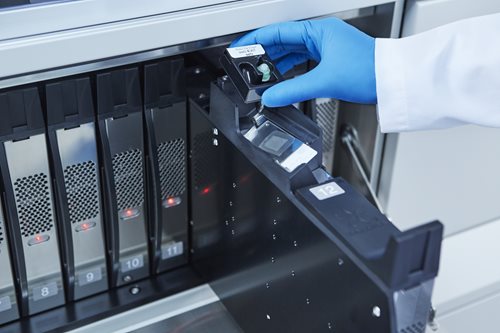Sakura Finetek SMART Automation systems for processing and embedding and the Tissue-Tek Genie
® IHC System provide THE best solution for laboratories to enable the fastest and most efficient delivery of optimal IHC quality.
The road to fast, efficient delivery of optimal IHC quality really begins during the pre-analytical processes in histology. Conventional tissue processing and manual embedding are inefficient processes that consume considerable amounts of precious time and resources. These areas are also prone to risks and errors that can jeopardize tissue and create costly and time-consuming rework. These potential issues may result in delays and have negative impacts on IHC quality before slides have even made their way to advanced staining.
.jpg?width=500&height=333)
SMART Automation from Sakura Finetek provides a LEAN solution to these problems, providing enhanced safety while saving considerable time, money, and resources. The
Tissue-Tek Xpress® x120 Rapid Tissue Processor is the only tissue processor with a completely error-free reagent system, ensuring that patient tissue remains safe so Rachel and her team does not have to worry about making a mistake that could jeopardize a patient’s tissue or negatively impact the IHC. The
Tissue-Tek AutoTEC® a120 Automated Embedding System utilizes the
Tissue-Tek® Paraform® Sectionable Cassette System to ensure that orientation of tissue is properly preserved from grossing through to microtomy, thereby eliminating the risk of orientation mistakes, tissue loss, and cross contamination for increased patient safety. This unique embedding automation solution is capable of
substantially decreasing errors that commonly occur during manual embedding by up to 44%, protecting tissue and removing that wasteful rework from Rachel’s to-do list.
.jpg?lang=en-US&width=380&height=569)
SMART Automation also enhances laboratory efficiency to shorten TAT, allowing IHC slides to be delivered to Dr. Amaya faster than ever before. The continuous flow of the Xpress
x120 means that Rachel can load tissues when she is ready instead of wasting time waiting to collect large batches for conventional processing that eat into the lab’s TAT. The Xpress
x120 can process multiple tissue runs simultaneously with no slowing down, which gives Rachel and her team increased workflow flexibility and speed. With rapid processing capabilities beyond just biopsies, the Xpress
x120 reduces the processing time of large tissue specimens from 8 hours on a conventional processing platform to only 2.5 hours,
saving up to 5.5 hours with comparable results for both H&E and IHC. Combined with the continuous automated embedding throughput of up to 120 Paraform Cassettes per hour on the AutoTEC
a120, SMART Automation provides high-quality, safe tissue processing, consistent clean blocks, and
improved turnaround time of up to 10 hours from grossing to microtomy versus conventional systems.
SMART Automation empowers Rachel and her co-workers to better utilize their time and skills in the laboratory as well. The Xpress
x120 utilizes less than 16 liters of on-board reagents, and processing reagents can be exchanged in less than 90 seconds, completely error-free, so Rachel spends less time doing reagent exchanges and more time doing more important tasks. The SMARTair™ technology of the AutoTEC
a120 automates the block cleaning process so that blocks are ready to go right to microtomy when embedding is finished, so Rachel no longer wastes her time scraping or melting wax off the sides of blocks. Automating the very labor-intensive task of embedding frees Rachel and her staff to do other value-added tasks like microtomy, running IHC, or digital imaging.

Once slides are ready for IHC, the
Tissue-Tek Genie Advanced Staining System ensures predictable turnaround time with maximum flexibility while producing optimal-only IHC staining. The Genie enables Rachel’s team to run any slide, any stain, on any instrument, at any time. The 30 completely independent staining stations require no slide scheduler and enable true continuous random access while the innovative single-use antibody capsule format allows Rachel the flexibility to run any IHC stain on any open station as soon as it is requested. IHC tests are finished in just 2-3 hours, and with ready-to-use reagents for fast and easy reagent exchanges and no additional messy oils or cover tiles, Rachel’s team has more time to do value-added tasks and deliver finished slides to Dr. Amaya sooner.
The rigorous methodology applied to developing reagents and protocols for the Genie also means that Dr. Amaya will always receive optimal, highly reproducible IHC staining quality. Genie reagents and antibodies provide optimal-only IHC staining, so that Dr. Amaya always has full confidence in the results, reducing calls to the laboratory for repeats due to quality issues. Fewer repeats means that Rachel and the lab has less rework and more time to complete other tasks. Receiving optimal quality IHC slides quickly and efficiently means Dr. Amaya will never again have to ask, “Where are my IHC slides?”